Obara Meyi: Meaning, Tips, Sayings, Traditional and more (6-6)
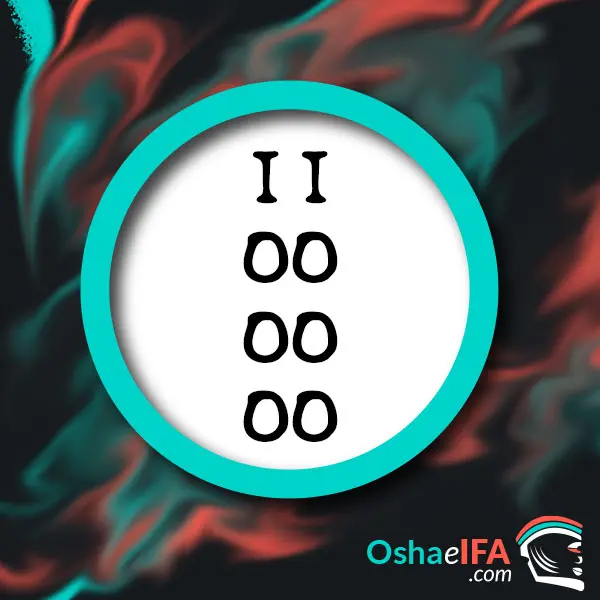
The oddun Obara Meyi denotes uncertainty or suspense, and incapable of making decisions. People with this Odu are impulsive and very often fall victim to desires. They regret the decisions they make when they are in an anxious state. To thrive in life, those born under this sign need to feed their heads from time to time.
Analysis and reflection of Obara Meyi
Ifa says that we must have faith, because everything negative that we are suffering will pass, just as positive things have a cycle, negative things also and Obara Meyi manifests that a new position is yet to come.
We should not get impatient when we are looking for the path of prosperity, because Ifa says that good luck will come at the right time, we must learn to live in austerity, because many times we yearn and ask the deities for an Ire of money, but when it is arrives, it is very likely that it will be wasted and we will return to a situation of scarcity, the mistake is to focus on asking for money without having a plan on how to obtain it, keep it or multiply it.
Who does not learn to live without money when he gets it, goes crazy.
Obara meyi in love
Ifa advises making sacrifices thus counteracting the astral of loneliness that accompanies people who are governed by this odu, here we refer to bad breakups, where all the path traveled as a couple is forgotten, the effort made between both to achieve goals then become enemies. We must avoid starting a smear campaign against who was our partner, remember that speaking ill of that person who was our partner for so long, it also damages our image.
Obara Meyi is a complicated sign when talking about personal or love relationships, probably the environment we share with our partner is not the most convenient because some people will try to destabilize us by creating slanders and lies that will shake the foundations of our relationship.
Ifa also advises that we should listen to our partner, many times it will advise us in the best way, but because of our own we end up not listening. Advice from our partner is synonymous with domination.
Economic aspect
Ifa says that we should care about our interests as well as for the benefit of others, it is recommended to ask Ifa what business we should undertake individually and do the relevant ebbo that Orunmila recommends, so prosperity will come. If the person being consulted is in a business or project together with another person, they should ask themselves if they should undertake the same activity individually, since the astral of their partners is hindering progress.
Obara Meji predicts the well-being of prosperity and good luck for the person to whom Obara Meji is revealed, Prosperity accompanied this person on his journey from heaven to earth, on the way they distanced themselves, but soon they will return to meet.
The little ones are guessing Ifa
And the little ones are holding the determinations of Ibo
Oroore birds have no elders among them
They are so small and the same size as they perform the Ifa rituals
They are all beautiful when we look at them
Those were the declarations of Ifa for Eji Obara
Who would come to earth with prosperity from heaven
Like the Oba of the rich
He was advised to offer sacrifice.
He obeyed Not too late, and not too far
Let's get together in the middle of it all.
What is born in the odu of Ifa Obara Meyi?
- The color blue and the light blue necklace.
- The ureters and fallopian tubes.
- Herpe, and dry it.
- The testicles.
- Monetary counterfeiting.
- In Obara Meyi the reason why Awó pacts and dances with Ikú (death) in the dance of Athens is born.
- Sucking in sexual intercourse.
- The spirit of Oduduwa called Kapaya.
- Quake.
- The sand tubes.
- The pyramids and the ramparts
- Wisdom, tongue and smoke signals.
- The Paoyé of Oduduwa and Orisha-Nla.
- The teachers and the chains of the teachings.
- Revelations through dreams.
- The children.
- Riches; the jewels were known.
What is the Obara Meyi sign talking about?
- The kingdom of Adifa (The kingdom of diviners or fortune-tellers).
- The air, the genealogy, the good families and the rustlers.
- The quail.
- The pitchfork.
- Here: The deity Oduduwa must be received.
- The person can be the object of slander and must be careful when speaking.
- Shango defeated the trees.
- Oshún made the first pumpkin lamp and danced with it on his head.
- Oshún performed miracles by healing the belly on the river bank with the gourd.
- Speak disappointment in the house (betrayal in marriage)
- You do not eat coconut, ram, frog, melon, rabbit, goat, pigeon, cornmeal in any form.
- What is not done at home is done on the street.
The sign Obara Meyi (6-6) indicates:
- Marital separation mark.
- Here: Mark tears and sorrows, great tragedies.
- Dog is sacrificed to Osanyin.
- Ram is offered to Ogún along with Shango.
- The plants are: Lily, plantain, mamoncillo, pumpkin, curujey, Ikin leaves, melon, water flower, river flax, mongoose,
- yagruma, caimito and jobo.
- The diseases are: Sterility, difficulties in childbirth, alcoholism and a condition in the throat (tonsillitis).
- Shango became a Saint, but he cried blood out of grief, boredom, and bad behavior of humanity, and was doing Ifá in Ika
- Ogunda.
- Shango reproached the Orishas.
- Obara Meji, gave the Athena of Olofin. Balance between life and death.
- The letter is destroyed with ekó and water in the house.
- Obara Meyi is an Oddun of lies and betrayal.
Recommendations of the Obara Meji sign
When the Odu OBARA MEJI is presented at the Igbodun Initiation ceremony, the initiate should be told that: Before offering food to a deity, the one offering it should beg on his knees to accept the sacrifice. He must offer a goat to ESHU, a goat to his Ifá and a bag of kolá seeds to achieve prosperity.
He must be asked first if his father is still alive or if his end is near. You can not drink wine or any other type of alcoholic beverage, avoid sharing the legacy of a deceased. Three days after the oddun has come out in the Igbodun, he has to prepare the Eshu altar for his Ifá. Then he has to buy a guinea for his mother if she is alive and pray to her head; but if your mother is dead you have to wear it on her grave or on her left big toe. He must also beg his head with two guineas and prepare to receive Ogun and Eziza.
Against envy and enmity he must offer a rooster, a hen and a goat to Eshu, in addition, a goat to his Ifá.
To be able to live for a long time on Earth (Ono-Ifá), you must make this special sacrifice, which consists of taking the Omiero of three plants (curujey, mata de Ikín and flower of water) daily, which are collected with the following enchantment: «My father told me before he died that he had gone to Heaven to answer for me, since I had been called too early to leave this world. He also told me that I should not abandon it until a tree called aro in Yoruba and uruari in Beni (flower of water) did not produce leaves; until the roots of a plant called ose in Beni and afuma in Yoruba (curujey), which grows on the top of the trees, did not touch the ground and, until ela (Ikín plant) did not drop its leaves ». Thus, OBARA MEJI lived two hundred and sixty years.
In Obara Meyi, to acquire great wealth you must offer a goat to your Ifá, kolá nut, melon, white cloth, mashed yam, goat to ESHU and offer a banquet with goat. That day you will not be able to leave the house. For the wealth to last, he must offer a black cow, a brown and a white cow, a goat with the same colors to his Ifá and a goat to Eshu.
If this Odu Obara Meyi comes in an Awafakan or Ikofafun ceremony, he has to serve his head quickly with a pigeon or hen.
In order not to die poisoned, he must offer a rooster and a rabbit at a crossroads, mashed yams and a goat to Eshu.
So that your children do not die at birth, you must make the following sacrifice: a soap, add the three sacred leaves of aro (flower of water), afuma (curujey), and ela (mata de ikín) and have all these materials one day at a time. serene at the altar of ESHU to then bathe the child.
Here you can lose your life as a result of a plot against you. Therefore, he must sacrifice a goat to ESHU, a ram to Egun and a frog to the earth (Otá Olé). On the day of the sacrifice, he must find a dog and feed him cold bean shaved breads. In addition, he must sacrifice three plates of soup, three thick yams, bathe, and ask for his children.
Obara Meyi in Ire:
Here Oduduwa is received. The person must serve Oduduwa and Orisha-Nla in order to win the war he has with his enemies.
You must take care of your properties or belongings by yourself and not depend on others to do so, your destiny and prosperity depend on your personal effort.
Here the person can be slandered, but he also has to take good care of what he talks about. It can be proposed for a position, title or responsibility. For a fortune-teller with this Odu, he must start in the cult of the Orishas.
The fortune teller should be advised to seek his own Ifá so that ORUNMILA can help him find his true path. ORUNMILA and ESHU protect you.
To resolve an imminent danger of war against enemies who may wish for their death, the person who is divined with this Odu must put a lightning stone (Odú-Ará) on Shango and also serve him with the sacrifice that ORUNMILA indicates.
To achieve prosperity you must sacrifice to Orúnmila and Eshu what this Sign of Ifa prescribes.
Your truth can become a lie or vice versa. In this Odu wealth is attained at a mature age.
Sayings of Obara Meyi:
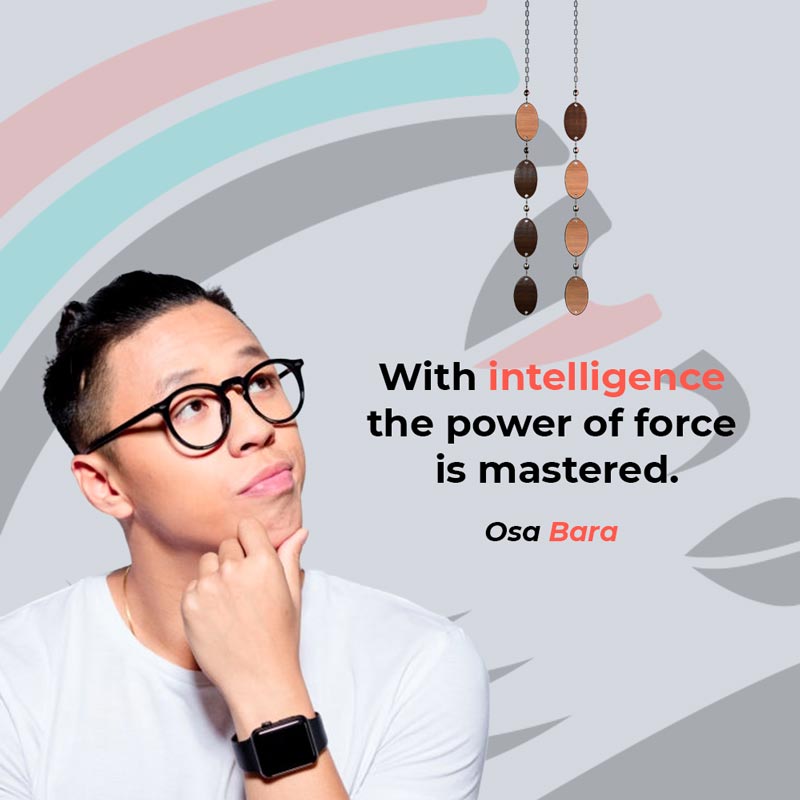
- Time is very slow for those who wait, very fast for those who fear, very long for those who suffer, very short for those who rejoice, but for those who love time is eternity.
- Death will hate him so much that it will not want him back in Heaven.
- This is the fan that raises the heat.
- Dead king, crowned prince.
- Without a watching mother, the life of a child would be impossible.
- Drinking puts the secret of a dangerous conversation at risk.
- You must take care of the big toe of your left foot like your mother's heart.
- The most hated muscle is the one that is always used for conversation, since its wealth or its sorrows depend on it.
- He who knows does not die like he who does not know.
- Do not speak and you will not bite your tongue, your tongue is your lion, if you let it it will devour you.
- The patient man becomes king of the world.
- The woman who eats from two hands loses her position.
- He who gives evil receives only that in return.
- Let me sit quietly and harmlessly.
- The language speaks a lot of good, a lot of bad.
Other sayings of the Obara Meji Sign (6-6):
- Other phrases of The good that is obtained in the sea, the red snapper catches it and retains it on the surface.
- The porcupine courts the leopard's wife and the leopard can't help it.
- Dead rooster speaks on the road.
- What is not today will be tomorrow.
- Man is born sincere and dies a liar.
- When the parrot speaks, the man is silent.
- The fan that moves never stops without meeting the air.
- The eye of the master fattens the horse.
- There is no poverty that does not come to an end.
Odu Baba Obara Meji Ifa Code of Ethics:
The Awó does not compromise because compromises turn against him.
Obara Meji bans:
Here the mother should not be mistreated or accused of flirting. Avoid eating rabbit. To beg the head you must use the following special enchantment: WONI KI OBA BORI OLOFEN, KORI OLOFEN FIN, KI OBARA BO AYA OLOFEN KAYA LOFEN GBA, KO FOWO KAN ALA, KODI DUDU, OBARA BORI OLOFEN, ORI OLOFEN OLOFEN FIN, OBARA BOAYA FIN, OBARA BOAYA AYA OLOFEN GBA, OBARA FOWO KAN ALA, ALA DIDUN DUN.
In this sign Obara Meji does not do favors for yourself, but if you are the favored one, you must be grateful to avoid a curse.
Do not jump holes, step firmly with a stick or cane. Revelation through dreams is born here.
You cannot be presumptuous and boastful or believe yourself superior to anyone.
Here the day that is sacrificed to a deity does not go out that day for the street. You have to wear white.
Ifa Obara Meyi Oddun Treatise:
For a person who is in business and who wants to have many clients and friends, he must make sacrifice and follow Orúnmila.
If this Odu is guessed to a person that apart from financial difficulties, the person is surrounded by enemies who want to destroy him with a surprise attack on his house or his life. All this can be eliminated if the person sacrifices, in the end the person will find his enemies and those who have created problems for him.
This Odu of Ifá Obara Meyi is feminine, son of Olofin and Amashe.
The metal of the Odu: Copper. The day of the week: Friday (hey-oti). The ruling planet: Venus.
This Oddun of Ifá is a bit difficult to explain because of its transformation and tough conversation that it brings with it. Talk about betrayals, bewilderment, insecurity. Obara Meji (6-6) is an Odu of disrepute and misrule. Their conversation is a bit awkward and unfortunate.
This Odu speaks of deceptions in the house. That the person does not have friends nor should he believe that his things are easy solutions, because in Obara Meyi the good and the bad in this life merge. In this Odu where you lie about sexuality and surely your spouse cheats on you and they have done aberrant things when it comes to sex. Here what the person does not do with his spouse, he does with him or with the lover.
Here you dream of something that has not been achieved. The woman, when she is with her husband, dreams of another man, she is too fiery and pretends not to feel with her husband. If it is a man, it is cold with the woman and ultimately they separate.
Meaning of the Obara Meyi Sign:
OBARA MEYI means: Two Kings, two Crowns.
In this sign it is one of tears and sorrows. It is an Odu of great tragedies. Their children are people who resent the things they have had to live, they are usually cheats and they are not frank with anyone, treating others with reservations.
In this Ifá the air was known, the Paoyé de Obatalá was created. Riches were born, jewels were created. Here if Ebó is not done, nothing is solved. The color blue and the light blue necklace were born.
The ureters were born, the fallopian tubes in the female organism. Herpe. The testicles in descents. The hills. It is the kingdom of Adipha (kingdom of soothsayers and diviners).
Here the men became rustlers (thieves). The Egyptian Pyramids were built. The following Deities speak: ABIKUES, OYA, OBATALA, DADA IGBAÑE, ORUNMILA, SHANGO, OSHUN, THE IBEJIS, OLOKUN, OLODUMARE, ESHU, ANCIENTS OF THE NIGHT, EZIZA, OSANYHIN, IYAMI OSHOOLONGA, EGUN, OSHOS IOSIHA I .
OBARA MEJI is the head of the Earth, it is wisdom. This was where the EGBA, went to the land of the Congos in search of Egun's Pledge Witchcraft. It tells of an Egun who left a garment buried in the field and wants the person to remove it and reactivate it.
Here the woman is sick to suck in sexual intercourse (mamú okó). You do not eat coconut, ram, frog, melon, rabbit, goat, pigeon, cornmeal in any form.
Here Shango defeated the enemies. This sign of Ifa expresses masculine strength and toughness. From OBARA MEJI depend the bifurcations, the bifurcated trees. Forks were born. Here OSANYIN is given a dog.
Obara Meyi's house is poor, but with a pumpkin and a parrot feather he becomes rich. If the Awó has money, he should beg his head with a paste fish (guaicán) so that he does not lose what he has.
Whoever gets this Odu in Atefá and lives at ORUNMILA's house with another Babalawo, will be unknown as Awó.
This Oddun punishes the Infidel Apeterbi with death.
Here was born the spirit of Oduduwa called Capaya, who kills adulteresses.
Here was born the earthquake, the sand horn, the pyramids, the walls, the wisdom, the language, the quail, and the pahoyé of Oduduwa and Orishanla.
This Odu Obara Meyi speaks of bewilderment, betrayal, insecurity, discredit and misrule. Their conversation
it is uncomfortable and infatuated.
Here it is used in the ORUNMILA necklace and in the Ide. A crystal ball.
The Ifá priest of this Odu must look on the floor on the mat. Fallen mark of a king (father), crowned prince (son).
Predictions of the sign of Ifa Obara Meyi 6-6
When Obara Meyi leaves in Igbodun during the Ifá initiation ceremony, the person must first be asked if the father is still alive, because if not, his end is near. You must forbid him to drink any type of wine and avoid sharing the legacy of a deceased. Three days after he has left in Igbodun he has to prepare an altar to ESHU for his Ifá. Then he has to buy a guinea for his mother if she is alive (to honor her head for him); if his mother is dead, he has to wear the guinea on her grave or on the big toe of her left foot.
He must also beg his head with two guineas and prepare conditions to receive the deities OGUN and EZIZA for himself.
If OBARA MEJI comes out in an Ikin divination, he has to serve his head quickly with a dove or a hen, if he comes out to a pregnant woman he can tell her with certainty that she will have Jimaguas.
When Obara Meji (6-6) comes out in divination with Okpele, the person has to serve OGUN and EZIZA with a rooster for each and he must be advised not to make any transactions, he must also be alert and not permanently visit clubs or meetings as it can find even death.
Tips from the Ifa Baba Obara Meyi Sign:
In this Odu (Obara Meyi) three men can make their wife fall in love and to prevent the blood from running, he must sacrifice a goat and a machete to Ogún. If the guessed woman is a woman, she must make the same sacrifice so that her husband does not kill her for her flirtation.
Vultures are not killed. The vulture is a very important bird in the sacrifice of Ifismo. Here the vulture announces death when it lands on its door, a goat has to be sacrificed to Eshu.
Obara Meyi marks marital separation. It is an Odu of tears and sorrows, great tragedies.
You have to be careful so that the ants don't fall into your ears and drive you crazy. You can even lose your life from sleeping in inappropriate places. You have to be obedient in the performance of the sacrifices.
Here the person has no fixed place, seek a seat and tranquility.
Here a dog is sacrificed to OGUN. Ram is also offered to OGUN together with SHANGO.
Says Ifa Obara Meji
Here you have to attend Orúnmila, the Saints and the Eguns.
This was where the cat became the servant of Orúnmila and Obatalá.
The Dead who speak (Eguns) are from the countryside, you have to make parties to the Ancestral Eguns and relatives. There is an Egun who has a garment buried in the field and wants you to remove it.
The teachers and the chain of teachings were born. Here the commitments made are turned against the person. The marked Works must be done quickly. The counterfeiting of the currency was born.
This is where OSHUN with the pumpkin made the first lamp and danced with it on his head.
He also began to perform miracles by curing the women in the river with the pumpkin and millet, since they did not give birth. Here the Ibejis made Gold (they sang) to Oshún with 25 bells and took it to a pumpkin patch.
Here umbrellas and flags were created, and the latter remained as emblems for having made Ebó. In this Odu the Awó should not believe himself superior to the others.
In this Ifá was where for the first time the Egun used the living to manifest and save the world.
Born: why the Awó dances and pacts with death in the dance of the Athena de Ifá.
Here things are done well that are not true and lies that are not. In this Odu Obara Meyi to solve problems, two black hens are given to Orúnmila, and brandy is blown on him. The hens are opened in the middle and cooked.
Ifa says that when Obara Meyi appears in Okpele or Ikin divination, (in ordinary divination), the person should be advised: If death is prowling him, he must sacrifice a goat, a ladder and white cloth to ESHU, another four-legged animal to the guardian angel, a ladder and white cloth.
If Obara Meyi comes out to a pregnant woman, she can be told with certainty that she will have a Jimaguas delivery.
Ogun and Eziza should be served with a rooster each and not get involved in any transaction; You must also be alert not to permanently frequent clubs, meetings or societies, as you may find death.
Prayer of the Odu Baba Obara Meyi:
BABA OBARA MEYI ONIBARA OLABARA EYEBARA KIKATE KOMOKATE ARAEY KOMOKATE ARA ORUN LODAFUN GBOGBO EYE OKO OREFE LORUGBO GBOGBO TENUYEN KEKERE MEJI.
Suyere of the Oddun Baba Obara Meji:
OMI GEGERE OMI GEGERE SHAKUA LUMA LAPEO IBI ABUDU YAYA LAE OTI ».
Ebbo of the Oddun of Ifa Obara Meyi:
Obbara Meyi's Ebbo to avoid the bad.
This Odu even when I mark Go, it does not have it, because here although it speaks all the good things, it also manifests all the bad things in the world and to avoid the latter; An Ekó is taken and it is broken up in water, Babá Ejiogbe is marked in the center of the Atepon of Ifá, to the right it is marked: Babá Obara Meyi and to the left: Obara-Bogbe, those Odus are prayed and the Iyefá Ekó with water and it is watered throughout the house, then raw flour is watered with okra over the above, the Ebó or Itá is followed and then everything is swept into the street.
Secrets of Obara Meyi:
1 white rooster, 1 dove, 7 slugs, 3 stones, 1 jug with river water, river sand, 3 small fresh fish, 3 hooks, 1 jar with jutía and smoked fish, corojo butter, honey, brandy, a lot of money.
With the heart of the rooster and the dove, sand, house soil, husk, large slug, cocoa butter, a guanine leaf, white piglet; an Inshe-Osanyin is prepared to solve situations. It's called OGAMAN.
In Obara Meyi, SHANGO speaks, commands and orders, but it is an Odu of lies and traction.
EBO: Here Ebbo is made with black cloth, yagruma, star apple, 1 rooster, a beef tongue, 1 chicken, 1 guinea, 1 pigeon.
The tongues of the rooster and chicken, after giving them to the Saint who took them, are buried at the foot of a bush of jobo with flour and okra. Omiero is made with the herbs: Yagruma and caimito and they are given guinea and pigeon blood, a little is added to Obatalá, and the head of the person concerned is washed and the rest of the grass for the Ebó.
Call to the Egun of Oddun Obara Meji.
EGUN MARARIN MAWA IKU Orun MARARIN AWA IFA
EGUN MUD EGUN AWA OLUBEKAN MAWA NAÑIRE
EGUN MORAKUN EGUN MAOYERE EGUN.
Herbs (Ewe) of the Odu Obara Meji 6-6:
Iroko, Yagruma, Caimito.
Pataki of the sign Obara Meyi:
Language
OLOFIN sent ORUNMILA to go to the plaza and prepare the best food for his children, he went out and saw a cow's tongue, bought it and when he arrived at the palace he seasoned it with all the condiments and cooked it to the point. When the guests arrived and sat down to eat, everything was rejoicing. At that point OLOFIN arrived and asked for his food and ORUNMILA presented him with his tongue.
OLOFIN, recognizing this delicacy, asks ORUNMILA: "Tell me why is that the best food in the world?" Then ORUNMILA answers him: Father because with a good language, a man, a people or a nation is saved, and with it, ashé is also given. With that answer OLOFIN was satisfied.
Soon OLOFIN asked ORUNMILA to prepare the worst food in the world for his children to try. ORUNMILA went to the plaza and looked for another language, which he prepares without seasoning, without salt, and poorly cooked.
When OLOFIN's children sat down to eat, no one was satisfied, when OLOFIN arrived and saw the food, he called ORUNMILA and said: -Explain to me why the first language was so tasty and this other one, being the same one, tastes so bad. Then ORUNMILA told him: «Father with a good language, as I told you before, you can do good things and with a bad language you can lose the world. OLOFIN was convinced of the great lesson he had taught his children and
as a reward he gave ORUNMILA the Ifá regime.
When BABA OBARA MEJI got rich. (The pumpkin).
OLOFIN sent for all the Babalawos, they came except OBARA MEJI. When they arrived at the OLOFIN Palace I had a great party prepared for them, where everyone had a lot of fun. Once the party was over, OLOFIN gave each one a pumpkin, which had virtue.
All the Babalawos withdrew from the Castle and when they passed the OBARA MEJI house, he had fed ORUNMILA, and invited them to come and eat, but they doubted that OBARA MEJI had food, because they said that OBARA MEJI was a liar. One of them decided to enter and when he saw that it was true, he was convinced he called all the others. They all entered and as they were hungry, because they had not given food at the party, they sat down and all that Obara Meji had they ate. When they finished eating when they left, everyone gave him the pumpkin that OLOFIN had given him, so that he would not have the work of carrying them. So everyone left their luck at Obara Meji's house.
A few days later, OLOFIN sent for all the Babalawos and they went to his presence, to which OLOFIN asked them about the pumpkins and what was their joy at the wealth that he had given them.
Then they answered OLOFIN that they had given it to OBARA MEJI on the day of the party, because he had invited them to eat. Then OLOFIN let them know that all those pumpkins had riches. This was where OBARA MEJI became rich through OLOFIN's merit.
Obara meyi Ifa traditional Nigerian:
ÒBÀRÀ MÉJÌ
It Osolo awo Awon
Ló día fun Awón
Níjó tí n lo rèé werí Olà lódò
Ará ro Òun báyìí?
Wón lára or rò ó
Wón ní sùgbón kó rubo fún Òsun
Ó bá rbo
Ará bá dè
Ni bá n bimo
Ló bá kó omo è lo fun Òsun
Niku WON ò gbodò pa sa Awon
hey hey
Òsun n tojú è
ní n gè é
N ní wá n jó n ní n yò
Ní n yin àwon Babaláwo
Àwon Babaláwo n yin Ifá
Ó ní béè làwon Babaláwo tòún wí
It Osolo awo Awon
Ló día fun Awón
Níjó tí n lo rèé werí Olà lódò
Òsóló mòmò dé ò
Awo Awon
E ò mò pÓrí rere lÀwòn n wè?
Ifá wants this person to be well. His Orí is destined to be rich and he will be rich in life. Ifá says that there is a Òsun in his lineage. If not, he should ask where he can find a place to offer sacrifice immediately. This is because all their fortunes are rooted in Òsun.
Òsòló is the priest of Awòn
What did he guessed for Awòn
The day he was going to wash his Orí of wealth in the river
He asked, "Will it be easy for me?"
They told him that it will be easy for him
But he was advised to make sacrifice to Òsun
He offered the sacrifice
Life pleased him
He started having children
He later brought his children to Òsun
They instructed "Death will not kill the sons of Awon"
Life pleased him a lot
Òsun took care of him and his children
And also spoiled them all
He began to dance and rejoice
He praised his Babaláwo
His Babaláwo praised Ifá
He said it was exactly what his Babaláwo had said
Òsòló is the priest of Awòn
What did he guessed for Awòn
The day he was going to wash his Orí of wealth in the river
Only really is here
He is the priest of Awòn
Didn't you know that good Orí is what Awòn washes in the river?
The 16 meyi of Ifa:
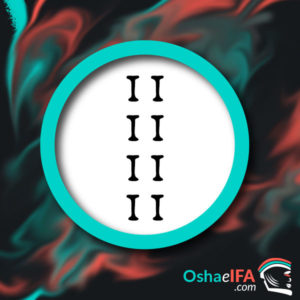




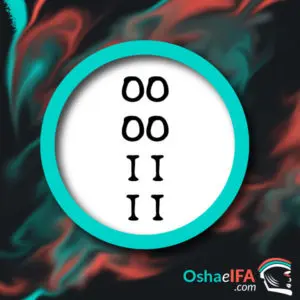
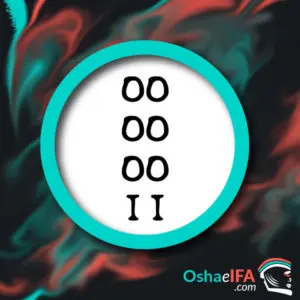
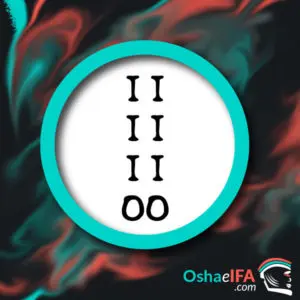
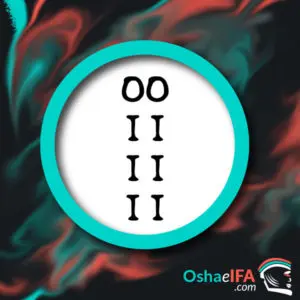
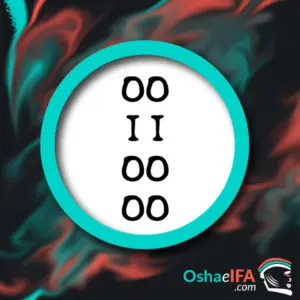
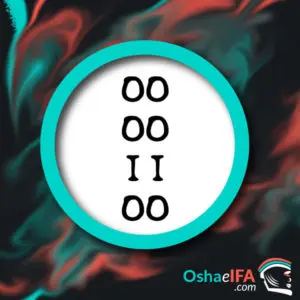
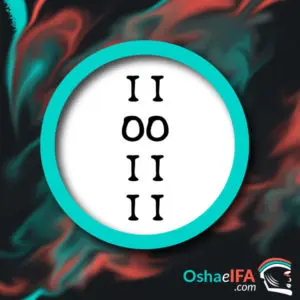
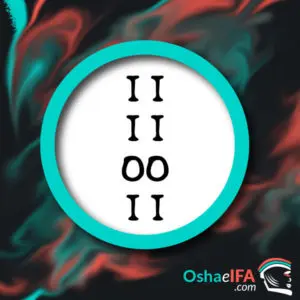
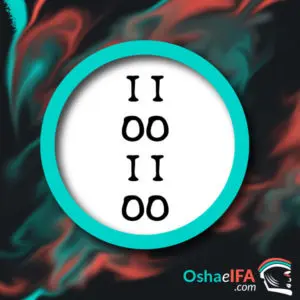
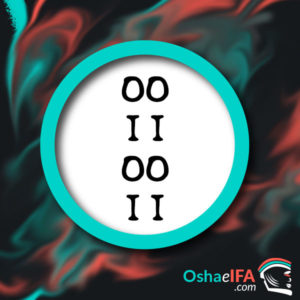
THANKS FOR SO MUCH TEACHING..I WAS BORN OF TWO CHANGOS AND I AM AZOYINKA..CROWNED BY MY BELOVED OMO OLU POPO AND OSHUN IS MY BELOVED MOTHER..MUCH ASHE AND BLESSINGS.
Ase 🙏 thank you for the clarity and your time and dedication.
Maferefun shango
Maferefun Oshun
iboru iboya
Ibosheshe
This is awesome 👌.
I love it and appreciate the teachings
Thank you for this teaching. Forever grateful
Thank you very much, nice teaching, ASHE
Where is the story of why Babalawo doesn't dance?
where is the story or patatín of why the Babalawo does not dance